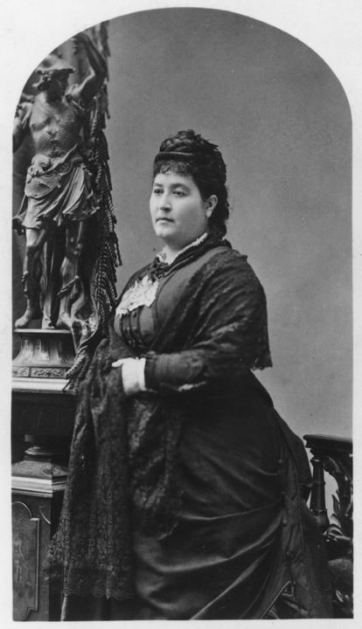 María Amparo Ruiz de Burton (July 3, 1832 – August 12, 1895) was the first female Mexican-American author to write in English. In her career she published two books: Who Would Have Thought It? (1872) and The Squatter and the Don (1885); and one play: Don Quixote de la Mancha: A Comedy in Five Acts: Taken From Cervantes’ Novel of That Name (1876).
María Amparo Ruiz de Burton (July 3, 1832 – August 12, 1895) was the first female Mexican-American author to write in English. In her career she published two books: Who Would Have Thought It? (1872) and The Squatter and the Don (1885); and one play: Don Quixote de la Mancha: A Comedy in Five Acts: Taken From Cervantes’ Novel of That Name (1876).
Ruiz de Burton’s work is considered to be a precursor to Chicano literature, giving the perspective of the conquered Mexican population that, despite being granted full rights of citizenship by the Treaty of Guadalupe Hidalgo, was a subordinated and marginalized national minority. Her background provided her a critical distance from the New England Protestant culture into which she was brought by her marriage to her husband, a powerful and influential Protestant Union Army General. Her life took her from coast to coast in the United States, which provided her with opportunity for first-hand observation of the U.S., its westward expansion, the American Civil War, and its aftermath. This vantage point and her status as a woman provided her with both an insider’s and outsider’s perspective on issues of ethnicity, power, gender, class, and race. (from Wikipedia).
Articles in Western American Literature
The Water-Energy-Food Nexus: Tracing Mexican American Environmental Concerns in Maria Amparo Ruiz de Burton’s The Squatter and the Don, by Anthony Gomez III.
Property and the Ideology of Improvement in María Amparo Ruiz de Burton’s The Squatter and the Don and California Travel Narratives, by Valerie Sirenko
Resistance to Containment and Conquest in Sarah Winnemucca’s Life Among the Piutes and María Amparo Ruiz de Burton’s Who Would Have Thought It? by A. Laurie Lowrance
Critical Regionalism, the US-Mexican War, and Nineteenth-Century American Literary History, by Randi Lynn Tanglen
Writing against Wilderness: María Amparo Ruiz de Burton’s Elite Environmental Justice, by Karen L. Kilcup
“An Eloquent and Impassioned Plea”: The Rhetoric of Ruiz de Burton’s The Squatter and the Don, by Elisa Warford
Mixed-Bloods, Mestizas, and Pintos: Race, Gender, and Claims to Whiteness in Helen Hunt Jackson’s Ramona and María Amparo Ruiz de Burton’s Who Would Have Thought It? by Margaret D. Jacobs